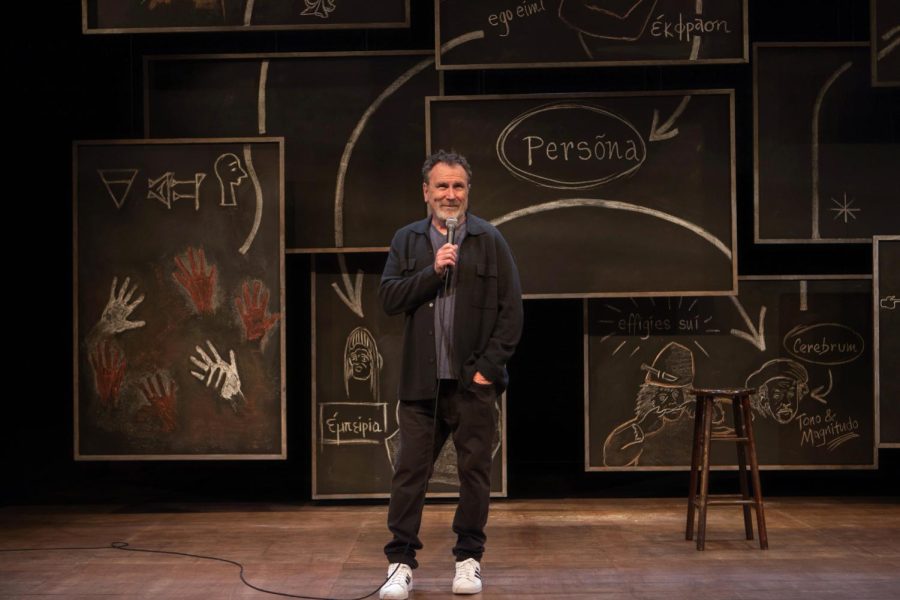The Talk of the Town: Colin Quinn’s Meditation on the Importance of Pointless Conversation
In his new comedy ‘Colin Quinn: Small Talk,’ the New York-based comedian dives into the peculiarities surrounding personality, America and social media at the Lucille Lortel Theatre
MONIQUE CARBONI
Brooklyn-born comedian Colin Quinn embraces the importance and beauty of the small and mundane interactions we have with others.
February 17, 2023
Being able to not talk to someone in a city like New York, with 8.4 million people, is a near impossible task to achieve. Everywhere you go, you encounter new opportunities for conversation: Someone will ask you about the weather, your day or the movie that you probably already saw but deny to have done so to evade meaningless chit chat. Avoiding people is inevitable, and so in today’s world, small talk is as well.
After successful off-Broadway runs of his shows “Unconstitutional,” “Colin Quinn: The New York Story” and “Red State Blue State,” Brooklyn-born stand up comedian Colin Quinn returned to the stage to share his own thoughts on the controversial topic of small talk. In his new solo show at the Lucille Lortel Theatre, Quinn broke down the basics of small talk, how it’s actually one of the most important parts of daily life, and how it informs our personality and the way we move through the world. For him, “engaging in small talk is like being two ships at sea that signal each other. They both know that they can’t help each other out, but they still acknowledge that they’re both boats and keep moving. It’s acknowledging the human experience in less than a paragraph.”
Contrary to Quinn, the majority of the world doesn’t enjoy small talk. Nowadays, people prefer meaningful, deep conversations rather than fake exchanges with strangers. Small talk has become a “waste of time,” and now phrases like “How about that Mets game?” or “Beautiful day isn’t it?” are seen as space fillers to avoid deeply uncomfortable silence. Even so, small talk is quite unavoidable. You can’t have deep conversations with everyone, and not being able to do so makes us want it even more; it’s just human nature. Quinn brought the fact that — as dreaded as it is — small talk is necessary – it’s the core of humanity.
Quinn started strong by laying out the basic rules of small talk. “Don’t just start talking, ease into it,” he said. “Talk about the weather, start with an exhale, nod!” He pointed out that “compliments work even if they’re not true” and ultimately created a list of small talk dos and don’ts that successfully grabbed the attention of the audience. His comments lived on the edge of funny and serious which felt like a perfect way to warm up the audience. For him, being friendly and knowing how to have the meaningless conversations that surround daily life is what allows a child to grow into a functioning adult.
He continued his show by expanding on how America has been shaped around small talk. He explained that everything depends on how you present yourself. “Your ID is who the government says you are; your personality is who the people who know you think you are; your reputation is who the people who don’t know you think you are; social media is who you think you are; and your browser history is who you really are,” he joked. According to him, his own browser history contains “a whole lot of Waffle House fights.”
After this, Quinn changed topics sporadically. He touched on the topic of social media which, according to him, has shifted our personality. “We all have famous people personalities now. We think everything we say is important,” he said.
He commented that “before, only math geniuses could use computers, but then Steve Jobs came into the world and now everybody has computers on them all time.”For him, everybody having computers on them all the time is like everybody having a helicopter license — it’s just dangerous.
These shifts made the show lag a bit. It felt as if he had run out of small talk topics and needed to fill up the space. Although he did have some good points, his ideas felt somewhat disconnected from the rest of the show.
Quinn wrapped up his show by going back to his original topic and getting back on track. In this last portion, he jumped from topic to topic in a seamless fashion. He discussed how philosophers were the original small talkers, the radical changes of language, and the “everyone believes they’re good people” phenomenon. He talked about the importance of last words. He joked about how “we live in the alter ego shadows of who we want to be” and about how it feels to live in a building that’s filled with teenagers as a 63-year-old man, and even though (as he pointed out) he was dressed like a teen — sneakers, baggy pants and a button up T-shirt — it’s quite easy to both laugh and empathize. As per usual, his delivery was honest and self-deprecating, and not in a bad way.
In its entirety, this show is a reminder of how much things change. The way we speak to and about one another changes, jokes change, politics change, and we change. But as long as we keep trying to acknowledge each other — either by talking about the weather or nodding hello — we’ll be okay.
“Colin Quinn: Small Talk” ran at the Lucille Lortel Theatre through Feb. 11. The solo comedy show will reopen at the Greenwich House Theater from March 30 to May 6.
















